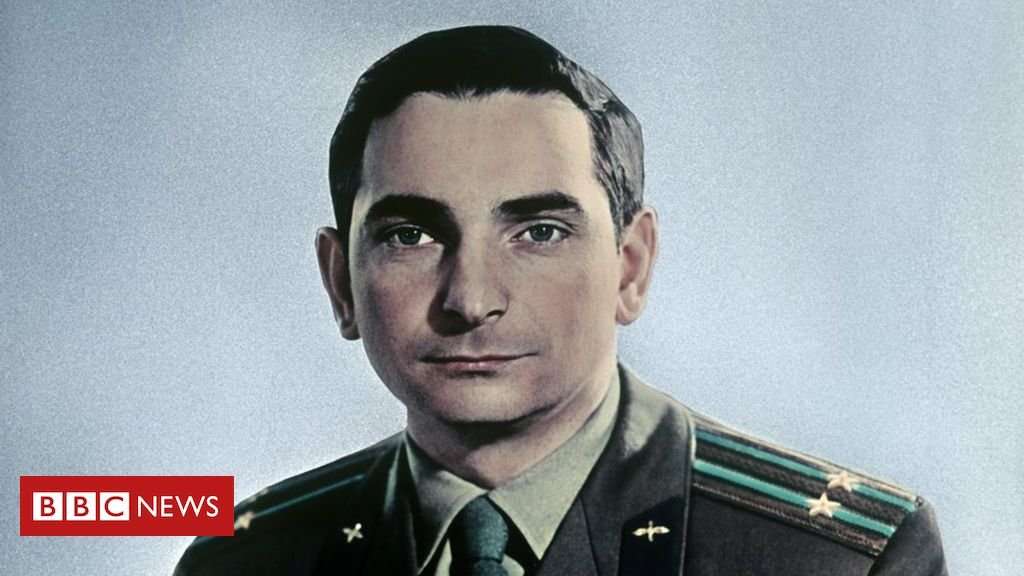Image copyright SPL Image caption Valery Bykovsky joined the first class of cosmonauts in 1960
Valery Bykovsky, who was the 11th person to venture into space and who held the unbroken record for the longest solo spaceflight, has died aged 84.
Bykovsky first flew aboard a Vostok 5 spacecraft in June 1963 and would go on to take part in two more USSR missions.
His record-setting solo flight saw him spend five days in space aboard the Vostok 5, orbiting the Earth 82 times.
Bykovsky was among the first group of USSR cosmonauts alongside Yuri Gagarin, the first person to travel to space.
His death on 27 March was confirmed by Russia's federal space corporation Roscosmos, but no cause of death was given. He leaves Alexey Leonov, the first spacewalker, and Boris Volynov as the last surviving members of that pioneering first group.
"Bykovsky belonged to the first generation of Soviet cosmonauts, who wrote many bright pages in the glorious history of Russian manned cosmonautics," officials at the Gagarin Cosmonaut Training Center in Star City said in a statement.
Image copyright SPUTNIK/SCIENCE PHOTO LIBRARY Image caption Bykovsky (L) with Valentina Tereshkova and Yuri Gagarin (R)
Valery Fyodorovich Bykovsky was born on the 2 August 1934 in Pavlovsky Posad, near Moscow. As a boy, he moved around due to his father's job at the Ministry of Railways, spending seven years of his youth in Iran.
In November 1955, he graduated from the Kachinsk Military Aviation Academy with top marks in flying and combat training. He started serving as a pilot the following year.
The First Soviet Cosmonaut Team, a history of the pioneering group, quotes Bykovsky's father as saying: "He (Valery) has always been courageous and exciting, and dangerous professions attracted him."
After his successful selection as a cosmonaut, Bykovsky was launched into orbit aboard the Vostok 5 mission, which lasted from 14-19 June 1963.
The spacecraft entered a lower-than-expected orbit. And while the craft was in good technical shape, it become apparent a few days into the mission that it was losing altitude faster than expected.
To prevent an uncontrolled re-entry, Soviet officials decided to curtail the flight and bring Bykovsky back to Earth. Although it has long since been surpassed in duration by missions carrying more than one crew member, it remains the longest flight by a single person.
Image copyright SPL Image caption The first Soviet cosmonaut class in 1961; Bykovsky is second from the right, middle row
Bykovsky's mission overlapped with that of Valentina Tereshkova, the first woman in space. At one point, the two Vostok spacecraft were said to have come within 5km (3 mi) of one other.
Tereshkova is now the last person alive to have flown in a Vostok ("east" in Russian), the first generation of Soviet-crewed spacecraft.
Bykovsky would have commanded the second flight of the USSR's Soyuz spacecraft, the general design still in use today. But the first flight, Soyuz 1, crashed into the ground at high speed in April 1967 after its parachutes failed, killing its sole occupant, cosmonaut Vladimir Komarov.
The same parachute fault was picked up in the Soyuz 2 craft, causing the flight to be cancelled.
Bykovsky trained for the Soviet Union's programme to land on the Moon, which was also cancelled after American astronauts Neil Armstrong and Buzz Aldrin touched down in the Sea of Tranquility in July 1969.
In September 1976, he made his second spaceflight on the Soyuz 22 mission. Bykovsky and fellow cosmonaut Vladimir Aksyonov spent a week in orbit photographing the surface of the Earth with a specially-built camera.
Image copyright SPL Image caption Valery Bykovsky speaks to a reporter after the landing of the Soyuz 31 capsule in 1978
The cosmonaut's third and final orbital flight would come on Soyuz 31, which docked in orbit with the Salyut 6 space station on 28 August 1978.
Bykovsky and Sigmund Jähn, the first German in space, spent six days on Salyut 6, visiting the orbiting outpost's two resident crew members Vladimir Kovalyonok and Aleksandr Ivanchenkov. Their tasks were to deliver supplies to the crew and carry out scientific experiments aboard the station.
Over his career, Bykovsky spent a total of nearly 21 days in space. He left the cosmonaut corps in 1982 and later worked in several roles at the Gagarin Cosmonaut Training Center at Star City near Moscow.
Bykovsky was married to Valentina Mikhailovna Sukhova, with whom he had two sons.

Subb0 on March 29th, 2019 at 11:03 UTC »
Is there any images of the inside? Curious as to what the conditions he had for 5 days was.
TeslaK20 on March 29th, 2019 at 10:07 UTC »
One of the last Vostok pilots. The first spaceship in human history.
onFilm on March 29th, 2019 at 09:36 UTC »
Five days in orbit inside a metal can, all by himself.